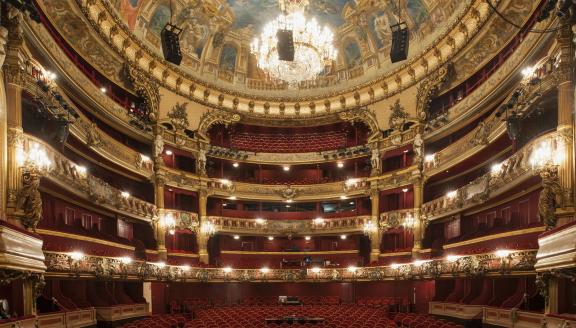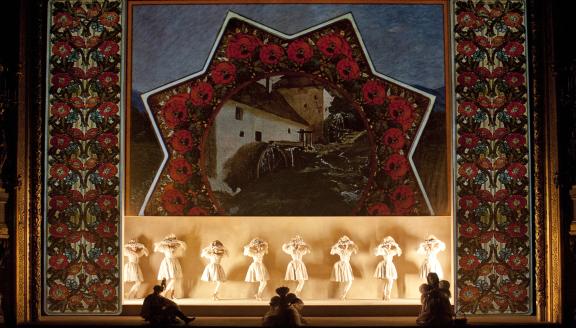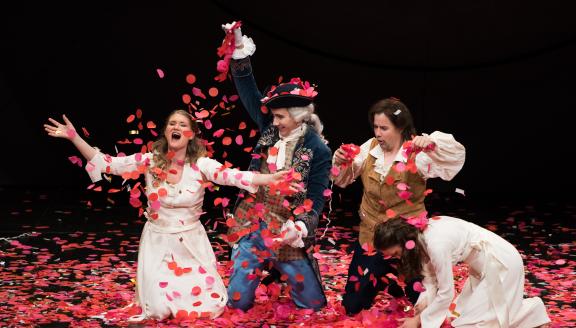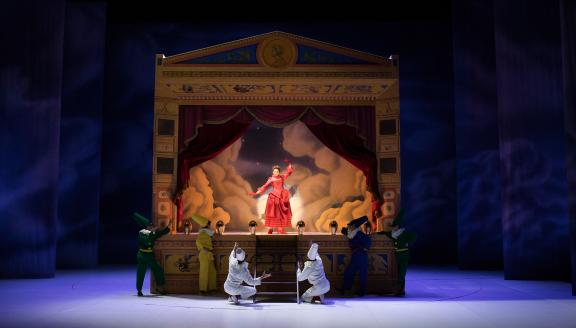

Opera for Beginners
The hall lights go out, the audience falls silent. Why is everyone clapping? A figure dressed in black enters the pit in front of the stage and bows energetically to the audience. It is the conductor who gives the starting signal: She raises her baton, and the first notes of the opera are heard. Not bad, but when will the singing begin? After a few minutes, the curtain, which had been closed so far, rises to reveal an opulent stage set. Someone is singing, but I can’t understand a word. Can’t you switch on the subtitles here somewhere...?
You have heard of La Scala in Milan or the Met in New York? You know the tragic stories of Carmen, Tosca, Tristan and Isolde? Perhaps you have marvelled at the breakneck vocal acrobatics of the Queen of the Night in Mozart’s The Magic Flute? Or can’t you get that one song from the pizza advert out of your head, what was it again, ‘la donna è mobile’? But you have never been inside an opera house, and now you are here, on a website devoted to opera. Where to begin?
Drama Set to Music
Many people associate the word opera with extravagant costumes, loud voices, rousing music and great emotions - but also with long evenings, strange traditions and out-of-this-world divas. For centuries, opera has played an important role as a living form of musical theatre and has spread from Europe to the rest of the world. Just as multifaceted as the visual arts, pop music and film, it is constantly evolving. Opera no longer only takes place just in opera houses, but also in the open air, as interactive performances or in the digital space.
Opera is generally understood to be a musical work composed to a specific text, known as the libretto. Just as in a classical play a text is spoken, the text is sung in an opera. The composer literally sets the tone: Their music is the interpretation of the libretto and it serves as the main framework for the realisation of the opera on stage. Sometimes the libretto is a work of art in its own right, but the composers are usually named as the main creators of the opera. Which is more familiar to you: “La bohème by Illica and Giacosa” (the librettists) or “La bohème by Puccini” (the composer)? You can find out more about the libretto, the music, the singing, and the staging of an opera here.
Then there are the venues in which such works take place: opera houses, festival stages or studios that have been specially designed for the performance of operas. Sometimes, however, operas are also performed in new, unusual spaces such as a railway hall or an aircraft hangar. The infrastructures required for a successful opera production form a cosmos of their own with a multitude of unique professional groups and activities.
An opera begins long before the curtain goes up and ends long after it has come down. It starts in my imagination, it becomes my life, and it stays part of my life long after I've left the opera house.
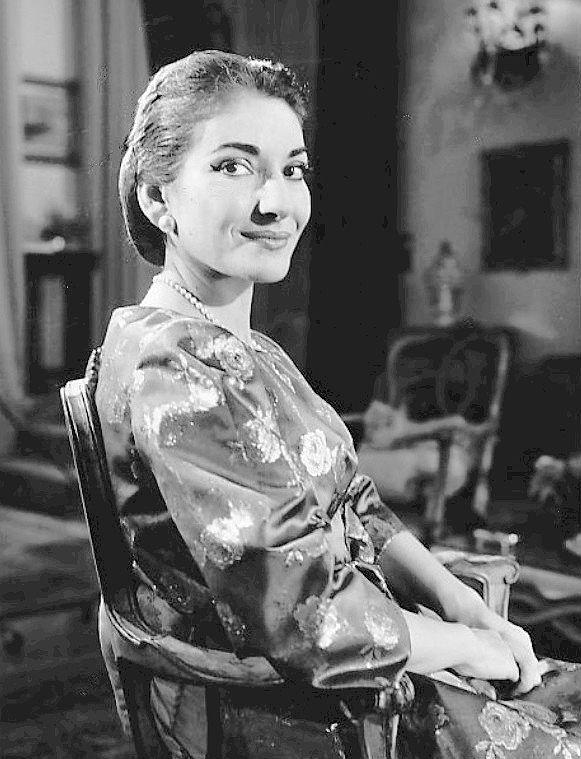
1. Programming an Opera
Long before the curtain rises for the audience, the management team of an opera house or company, usually the General Manager, the Artistic and Musical Director as well as the Dramaturg, decide which opera should be performed. Various questions can play a role here:
• Do the themes in this opera speak to our audience?
• Do we have enough space for all the orchestral musicians?
• Is the opera also suitable for children?
• How many people will be on stage, do we need an extra choir?
• Has the piece been performed here before?
• If we want to perform the opera in another language, is there a translation?
2. Creative Ideas and Staging
Once the decision has been made about what is to be performed, the question arises, who is responsible for the production, i.e. the practical realisation of an idea on stage? The creative team usually consists of the following positions:
• The director sets the conceptual focus of a production: Should the opera be understood as a tragic love story or a story of revenge? Is it set in 17th century Italy or in present-day New York? Which contemporary themes and discussions can be highlighted? During rehearsals, the director shows everyone on stage what they should do so that the creative idea becomes clear.
• The conductor interprets the score of an opera. Not only they decide how fast the music should be played and when there should be pauses, but they also shape the music together with the singers. During live performances, the conductor literally sets the pace for all involved.
• Stage and costume designers create the worlds in which the stories are told. These can be opulent, with historical references, simple or minimalist, all according to the effect that the final production should have. The designers provide the ideas that are realised by the workers in the workshops and tailoring departments.
• Dramaturgy plays a multifaceted role. Dramaturgs have excellent knowledge about the opera and its historical context, they advise the director, they write the programme booklet, they sometimes introduce the opera to different audiences, they create special events around a production, and much more.
The people who perform on stage are the ensemble. Some opera houses have permanent singers and a chorus; other houses, especially festivals that only take place in the summer, have to cast a new ensemble every season. Sometimes dancers, actors and extras are hired additionally.
A large number of professionals can be involved in an opera production, such as: choreographers show the ensemble the right steps in a dance scene. There might be a swordfight on stage, and special fencing or fight instructors come to instruct the ensemble. For operas in foreign languages, language coaches help with the correct pronunciation. For intimate physical scenes, there may also be intimacy coordinators in some productions.
The rehearsals last several weeks and usually take place on a separate rehearsal stage, without original costumes or stage sets. It is only in the last few days before the opening night that the production goes …
3. To the Stage!
Now for the theatrical magic! Many people from different departments work together to create a spectacular show for the audience: lighting designers bathe the stage in the right light; behind the scenes, technicians operate levers and pulleys to ensure quick changes of the sets (maybe there is a fog machine or thunderstorm effects for scary night scenes?); sound and video designers create special effects, video projections or sound effects (perhaps a radio is playing in the background?); on the day of the performance, stage managers guarantee that the show runs smoothly monitoring the events on-stage from a console next to the stage and giving signals for entrances, light and set changes.
But that is not all! Entire departments plan opera seasons, take care of performance rights and artists’ contracts, apply for funding and design the posters you see around the venue. On the day of the performance, ticket sellers and ushers help the audience in their final steps out of everyday reality into the magical world of opera. And, of course, the most beautiful among these operas are streamed, live or on demand, here on OperaVision - whenever you feel like watching opera!
Hannes Föst for OperaVision, December 2024
